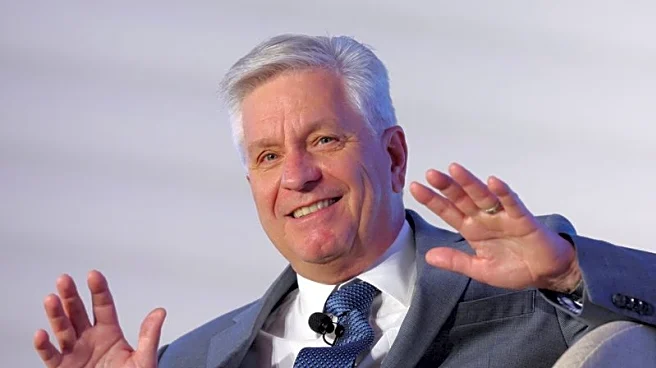(Reuters) -U.S. President Donald Trump is considering three finalists for Federal Reserve chair to replace Jerome Powell, whom Trump has criticized all year for not cutting rates as he has demanded.
Treasury
Secretary Scott Bessent, who is helping run the search, says the Fed's "policymaking arrogance" has caused missteps and on Friday called for a full review of how the central bank does its job, from how it sets interest rates to how it manages its police force.
Here is a look at recent comments by the three candidates, as well as the current odds on each in online betting markets.
CHRISTOPHER WALLER, 66, FED GOVERNOR
Chief research economist at the St. Louis Fed until Trump put him on the Fed's Board of Governors in Washington 2020, Waller addressed Fed independence in his first speech as a Fed policymaker. He was earlier than most of his colleagues in pushing the Fed to raise rates to fight fast-rising inflation in 2021. He argued that rate hikes would not necessarily drive up unemployment, a forecast that proved correct. This year he has been ahead of his colleagues in calling for policy easing. He dissented in July when the Fed decided not to cut rates.
Betting odds: 28% (Polymarket), 27% (Kalshi)
Key quote: "Based on what I know today, I would support a 25-basis-point cut... While there are signs of a weakening labor market, I worry that conditions could deteriorate further and quite rapidly, and I think it is important that the (Fed's rate-setting committee) not wait until such a deterioration is under way and risk falling behind the curve in setting appropriate monetary policy." August 28, 2025, speech to the Economic Club of Miami.
KEVIN HASSETT, 63, DIRECTOR OF THE NATIONAL ECONOMIC COUNCIL
Hassett is an economist and long-time adviser to Republican officials and conservative think tanks who entered Trump's circle during the president's first term, leading the White House Council of Economic Advisers from 2017 to 2019. As the White House's chief economic adviser now, he is a strong advocate for Trump's tariffs and other economic policies. He has echoed Trump's criticism of the Powell-led Fed and supported Trump's firing of the commissioner of the Bureau of Labor Statistics after the agency in August sharply revised down job gains from previous months.
Betting odds: 18% (Polymarket), 30% (Kalshi)
Key quote: "The frustration that the president has is that he believes that other countries have cut rates and the U.S. hasn't and he worries, just as with the BLS, he worries that maybe there's some partisan calculus going on here... It's very disappointing that the Fed would be putting an explanation out there for these unusually high rates that there's this massive uncertainty and massive inflation coming from tariffs without actually showing us their work." August 3, 2025.
KEVIN WARSH, 55, FORMER FED GOVERNOR, VISITING FELLOW AT STANFORD UNIVERSITY'S HOOVER INSTITUTION
Appointed to the Fed by President George W. Bush in 2006, Warsh was Fed Chair Ben Bernanke's lead liaison to Wall Street during the 2007-2009 financial crisis. He soured on the centerpiece of the Fed's crisis-fighting bond-buying program, saying it inappropriately inserted the central bank into the fiscal realm. He quit in 2011, cutting short a term that would have run to 2018. Trump nearly picked him to be Fed chair in 2018 and later said he wished he had. Warsh has used public appearances and opinion pieces since then to ramp up his criticism of the Fed.
Betting odds: 13% (Polymarket), 19% (Kalshi)
Key quote: "We can begin reform at the Fed with a rate cut - which is just a first step to regime change... Take a little of this looseness out of financial markets by getting the Fed out of the fiscal business, out of the political business; shrink that and then redeploy some of that liquidity to people who need it most in the real economy. I think the Fed has the balance wrong; a rate cut is the beginning of the process to get the balance right. A strong real economy is what we need so this can be a golden age." July 17, 2025 in CNBC interview.
(Reporting by Ann Saphir; Editing by William Mallard)









